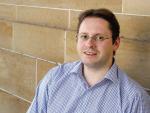Boarding school experiences uniquely Australian: study
 Education Education
Australian boarding schools are far from being replicas of the influential public boys' schools of Britain, according to the latest research by a University of Adelaide graduate. Dr Mathew White studied Australian boarding schools and investigated first-hand student experiences for his PhD thesis at the University of Adelaide's School of Education. He has been working for the past eight years at Geelong Grammar School in Victoria, where he is currently the International Baccalaureate Coordinator and the Assistant Head of Manifold House. "The findings of my research challenge the popular stereotype that Australian residential education is an anachronistic, inflexible, British colonial model," Dr White said. "The seeds of origin of Australian boarding schools may be British, but their education philosophy and social interaction patterns are reflective of Australian multiculturalism. "Boarding is a highly un-researched area in the Australian education system, which means our perception of it is reinforced by the ABC television's version of Tom Brown's School Days, which went to air recently portraying an image of the system being violent and inherently hierarchical." Dr White used a humanistic approach to gain data from memoirs written by a group of 45 Anglo-Australian and overseas-born boarding school students. "These memoirs were generated from concrete questions regarding place-of-birth, ethnic identity, and languages spoken at home, as well as questions that required students to reflect on their role in boarding school as a social system," Dr White said. The students' responses shed light on the overall positive home-like environment of boarding schools, and also suggested that boarding schools in some ways may in fact be better than home. "The respondent's personal statements revealed that the relationships among students, and among students and staff, in the boarding house tended to be personal and informal, and the success of a boarding school was determined by the personal atmosphere, support, and comfort of the boarding house," Dr White said. "The study also revealed an attitudinal shift in the group that welcomed the many cultures of the school, and recognised the single culture of the home." Although Dr White came across negative observations such as the pressures of homesickness, tedium of school life and lack of freedom in some of the students' written experiences, the overall impression was favourable. "The memoirs suggested that an education at the research boarding school was a crucible that forged students through a variety of experiences, positive and negative, individual and collective, for life." Despite being employed in Geelong, Dr White said he chose to do his PhD at the University of Adelaide because of the presence of multiculturalism policy experts like Professor Jerzy Smolicz and Dr Margaret Secombe in the School of Education. "Professor Smolicz has several theoretical writings on the subject of multiculturalism as well as on schools as social systems, and so his supervision benefited my research immensely. I also received excellent support from Professor Kevin Majoribanks," Dr White said. Story by Sukhmani Khorana
|





